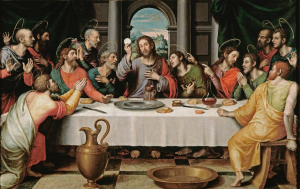HOMILY CORPUS CHRISTI – B
The Eucharist – Sacrament of Reconciliation
(Ex 24:3-8; Heb 9:11-15; Mk 14:1-16, 22-26)
***********************************************
Three sentences provide a background for today’s liturgy of Corpus Christi or Body and Blood of Christ:
Richard Rohr states “Transformed people transform people” and “We transmit the pain we don’t transform.” St. Thomas Aquinas wrote that Jesus “offered his body to God the Father on the altar of the cross as a sacrifice for our reconciliation” (St. Thomas Aquinas)
The main message of these statements is the Eucharist is a sacrament of transformation and reconciliation, calling us to live it out in two ways: forgiving those who hurt us, and seeking forgiveness from those we may have hurt.
The first reading from Exodus provides the background of the old covenant. Moses sacrificed animals as a burnt offering, dashed blood on the altar, read the book of the covenant, then splashed blood on the people, sealing a relationship of duty and obedience between God and the people. Unfortunately, they were never faithful to this covenant, breaking it over and over again, up to the time of Jesus.
 In the gospel during the Last Supper with his disciples, Jesus establishes a new covenant, not through animal sacrifice, but through his own body and blood as the true Lamb of God who will take away the sins of the world. The next day, his body was broken on the cross, and blood and water flowed from his side. That symbolized two realities: the new, divine eternal life he wants to share with us, but also the birth of this new covenant, as blood and water is involved in birthing a child into the world.
In the gospel during the Last Supper with his disciples, Jesus establishes a new covenant, not through animal sacrifice, but through his own body and blood as the true Lamb of God who will take away the sins of the world. The next day, his body was broken on the cross, and blood and water flowed from his side. That symbolized two realities: the new, divine eternal life he wants to share with us, but also the birth of this new covenant, as blood and water is involved in birthing a child into the world.
The moment Jesus died on the cross, the curtain in the temple was torn from top to bottom. That curtain was there to separate people from the Holy of Holies. With the death of Jesus, there is no more separation between God and humanity. We can now see right into the heart of God, and what we see, for the first time in history, is who God truly is: mercy, compassion, unconditional love, forgiveness and total non-violence. This is the basis for a truly new covenant between God and humanity.
The letter to the Hebrews strives to explain this new covenant reality. Whereas under the old covenant, the high priest came through the curtain to sprinkle the people with the blood of animals that was powerless to do anything, Jesus is the new high priest, mediator of a new covenant, who abolishes the curtain and sprinkles us with his own blood that gives us eternal redemption.
As the Messiah, Jesus redeems us and sanctifies us, forgives us and heals us, sets us free from guilt and fear, and transforms us into his own body. There are two miracles that happen during the Eucharist: humble gifts of bread and wine are transformed by the power of the Holy Spirit into the body and blood of Jesus, but also, we who receive are transformed into the Body of Christ.
As the Body of Christ, forgiven and redeemed, we are empowered to live out the Eucharist in two very important ways: to forgive from the heart anyone who has ever hurt us in any way, and to genuinely seek forgiveness from anyone we may have hurt in any way.
In Matthew 18:15-17, perhaps the least understood and appreciated passage in the New Testament, Jesus teaches us how to forgive. Instead of fight, flight or flee – we are to forgive by communicating with love. We are to go to the persons who have harmed us and very simply share our hurt feelings with them without any attempt at revenge or punishment, tell them we are trying to forgive them, and then let it go. That simple action sets us free, brings us peace, restores our dignity because we are just like Jesus on the cross, and opens up the possibility of reconciliation.
In Matthew 5:23, Jesus shows us how to seek reconciliation. If we are in church and have our gift at the altar yet realize that someone may have a grudge against us, we are to leave our gift at the altar and go apologize first and make amends, then we can come and celebrate the Eucharist with integrity. If the other person can forgive us, then we are reconciled, the kingdom of God has just been built up here on earth and the Eucharist truly lived out.
Were we to take these teachings at face value and truly live them, I suspect that on any given Sunday perhaps half of the congregation would have to get up, leave the church, and seek to be reconciled with someone. At one gathering in the north during a mission, one of the leaders, right after mass, publicly apologized to someone he had offended during a political campaign. That action touched everyone’s hearts, and I suspect, led to other reconciliations later.
So, as we celebrate this solemnity of the Body and Blood of Christ, let us pray we may live out the Eucharist by seeking reconciliation with others through forgiveness and/or the art of an apology, so that we will never transmit the pain we have not transformed, and will become transformed people who will help to transform others.



